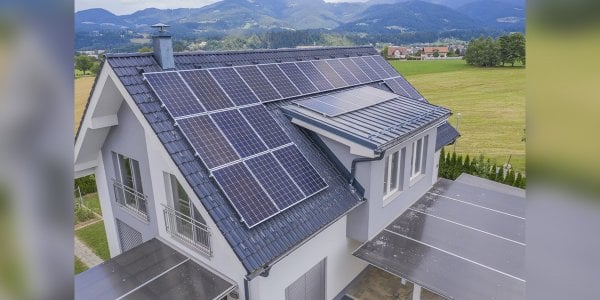Discover how your family could be cashing checks instead of paying bills to power providers
By
VanessaC
- Replies 27
Did you know that instead of receiving a bill in the post, you could be receiving a cheque if you play your cards right with your power provider?
Sydney dad Kurt McLachlan doesn't get a bill for his power usage. Instead, he gets what most would consider a rather welcome surprise–he gets paid!
While most of us are struggling with the continuous rise in prices for power, McLachlan's electricity bills have, at times, totally vanished.
'In April it was 220 bucks, then 190, then 99, and this month I'm on track to receive a $50 rebate,' he said.
So how did he manage that? He's been using Amber Energy for the past five months, a power company that offers access to wholesale electricity prices.
He has been enjoying 34 cents per kilowatt-hour through wholesale feed-in tariffs.
The basic concept behind a feed-in tariff is to offer a fixed, premium price for the electricity generated from renewable sources like solar, ensuring that the producers of such energy receive a guaranteed income for a specified period of time.
'When we get the peak solar, I'll go from a $20 to $50 rebate to $500 or $600 a month,' McLachlan shared.
How does it all work?
The traditional energy model involves the generation of energy, which then enters the grid. Then, retailers buy it from wholesalers before selling it to consumers at individually fixed prices.
Amber Energy, however, takes retailers out of the equation, providing customers with direct access to wholesale energy prices with a monthly subscription fee of $19.
Moreover, through their app and automated software, it is easier to track when wholesale prices are lowest which is the best time to buy, and when they are highest which is the best time to sell. This gives users freedom on when to use power to maximise their savings.
‘It creates an option for people to take advantage of that and make it cheaper for themselves,’ Chris Thompson, Co-Founder of Amber Energy, said.
But there's a catch–accessing wholesale energy sure seems exciting, but tying yourself to fluctuating prices can be a bit risky. If the wholesale energy price soars, guess what happens to your bill?
However, Thompson assured: ‘We've got protections in place to make sure we guarantee customers never pay over a certain price in a given quarter to be able to offer that sort of security and peace of mind.’
The benefits to households without solar or batteries are certainly there, however households with solar or batteries will benefit the most.
‘It looks good on paper, but if you're not ticking all the boxes, it may not be right for you,’ Compare the Market's Philip Portman said.
While Amber does offer energy below the default market offer, Portman said exploring your options has its advantages:
'Right now, Glowbird is offering a plan which is 18-per-cent below the default offer, there's Ampol which is about 17-per-cent and Origin which is also around 17-per-cent.'
You can watch the full report below:
Remember that this is not personal financial advice–the information provided here is general. It's crucial to consider your personal circumstances prior to making any financial decisions.
If you want to know more, you can read this article for more information on investing in batteries for solar panels.
You can also check this article to see if you are eligible for Energy Rebates!
 Members, what are your thoughts on this topic? How are you managing your energy bills lately? Do you have any money-saving tips or advice you’d like to share? Let us know in the comments below!
Members, what are your thoughts on this topic? How are you managing your energy bills lately? Do you have any money-saving tips or advice you’d like to share? Let us know in the comments below!
Sydney dad Kurt McLachlan doesn't get a bill for his power usage. Instead, he gets what most would consider a rather welcome surprise–he gets paid!
While most of us are struggling with the continuous rise in prices for power, McLachlan's electricity bills have, at times, totally vanished.
'In April it was 220 bucks, then 190, then 99, and this month I'm on track to receive a $50 rebate,' he said.
So how did he manage that? He's been using Amber Energy for the past five months, a power company that offers access to wholesale electricity prices.
He has been enjoying 34 cents per kilowatt-hour through wholesale feed-in tariffs.
The basic concept behind a feed-in tariff is to offer a fixed, premium price for the electricity generated from renewable sources like solar, ensuring that the producers of such energy receive a guaranteed income for a specified period of time.
'When we get the peak solar, I'll go from a $20 to $50 rebate to $500 or $600 a month,' McLachlan shared.
How does it all work?
The traditional energy model involves the generation of energy, which then enters the grid. Then, retailers buy it from wholesalers before selling it to consumers at individually fixed prices.
Amber Energy, however, takes retailers out of the equation, providing customers with direct access to wholesale energy prices with a monthly subscription fee of $19.
Moreover, through their app and automated software, it is easier to track when wholesale prices are lowest which is the best time to buy, and when they are highest which is the best time to sell. This gives users freedom on when to use power to maximise their savings.
‘It creates an option for people to take advantage of that and make it cheaper for themselves,’ Chris Thompson, Co-Founder of Amber Energy, said.
But there's a catch–accessing wholesale energy sure seems exciting, but tying yourself to fluctuating prices can be a bit risky. If the wholesale energy price soars, guess what happens to your bill?
However, Thompson assured: ‘We've got protections in place to make sure we guarantee customers never pay over a certain price in a given quarter to be able to offer that sort of security and peace of mind.’
The benefits to households without solar or batteries are certainly there, however households with solar or batteries will benefit the most.
‘It looks good on paper, but if you're not ticking all the boxes, it may not be right for you,’ Compare the Market's Philip Portman said.
While Amber does offer energy below the default market offer, Portman said exploring your options has its advantages:
'Right now, Glowbird is offering a plan which is 18-per-cent below the default offer, there's Ampol which is about 17-per-cent and Origin which is also around 17-per-cent.'
You can watch the full report below:
Remember that this is not personal financial advice–the information provided here is general. It's crucial to consider your personal circumstances prior to making any financial decisions.
If you want to know more, you can read this article for more information on investing in batteries for solar panels.
You can also check this article to see if you are eligible for Energy Rebates!
Key Takeaways
- Sydney resident Kurt McLachlan has been receiving rebates instead of bills due to using wholesale electricity provider Amber Energy.
- Amber Energy provides access to wholesale energy prices and charges a monthly subscription fee of $19.
- Amber also offers software that enables home batteries to buy energy when prices are at their lowest and sell when they're at their highest.
- While wholesale energy can be cheaper, fluctuations in wholesale energy rates can mean significantly fluctuating bills.
- Amber claims to have protections in place to guarantee customers never pay over a certain price in a given quarter.








